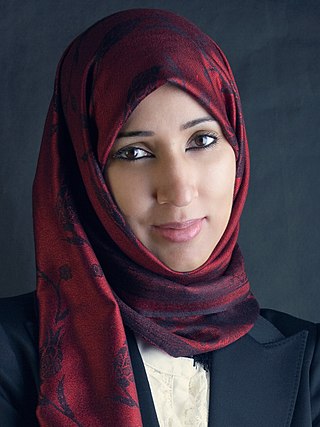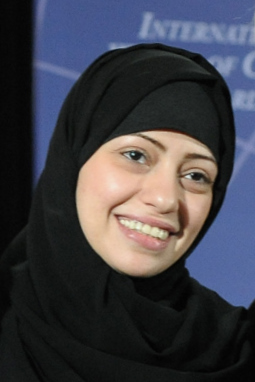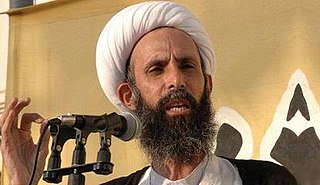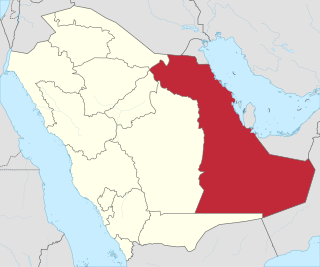
Human rights in Saudi Arabia are a topic of concern and controversy. The Saudi government, which mandates both Muslim and non-Muslim observance of Islamic law under the absolute rule of the House of Saud, has been accused of and denounced by various international organizations and governments for violating human rights within the country. The authoritarian regime ruling the Kingdom of Saudi Arabia is consistently ranked among the "worst of the worst" in Freedom House's annual survey of political and civil rights.

Terrorism in Saudi Arabia has mainly been attributed to Islamic extremists. Their targets included foreign civilians—Westerners affiliated with its oil-based economy—as well as Saudi Arabian civilians and security forces. Anti-Western attacks have occurred in Saudi Arabia dating back to 1995. Saudi Arabia itself has been accused of funding terrorism in other countries, including Syria.

The protests in Saudi Arabia were part of the Arab Spring that started with the 2011 Tunisian revolution. Protests started with a self-immolation in Samtah and Jeddah street protests in late January 2011. Protests against anti-Shia discrimination followed in February and early March in Qatif, Hofuf, al-Awamiyah, and Riyadh. A Facebook organiser of a planned 11 March "Day of Rage", Faisal Ahmed Abdul-Ahad, was allegedly killed by Saudi security forces on 2 March, with several hundred people protesting in Qatif, Hofuf and al-Amawiyah on the day itself. Khaled al-Johani demonstrated alone in Riyadh, was interviewed by BBC Arabic Television, was detained in ʽUlaysha Prison, and became known online as "the only brave man in Saudi Arabia". Many protests over human rights took place in April 2011 in front of government ministry buildings in Riyadh, Ta'if and Tabuk and in January 2012 in Riyadh. In 2011, Nimr al-Nimr encouraged his supporters in nonviolent resistance.

Eman al-Nafjan is a Saudi Arabian blogger and women's rights activist. She was detained by Saudi authorities in May 2018 along with Loujain al-Hathloul and five other women's rights activists in what Human Rights Watch interpreted as an attempt to frighten her and the other activists, during the 2018–2019 Saudi crackdown on feminists.

Manal al-Sharif is a Saudi women's rights activist who helped start a right to drive campaign in 2011. Wajeha al-Huwaider filmed al-Sharif driving a car as part of the campaign. The video was posted on YouTube and Facebook. Al-Sharif was detained on 21 May 2011, released, and then rearrested the following day. On 30 May, al-Sharif was released on bail, on the conditions of returning for questioning if requested, not driving, and not talking to the media. The New York Times and Associated Press associated the women's driving campaign as part of the Arab Spring and the long duration of al-Sharif's detention due to Saudi authorities' fear of protests.
Khaled al-Johani is a teacher of religious instruction in Riyadh, Saudi Arabia. He was imprisoned, without charges or trial for nearly one year, at ʽUlaysha Prison for having publicly asked for freedoms and democracy in Saudi Arabia – an absolute monarchy – during the 2011–2012 Saudi Arabian protests. His public statement was made to a BBC Arabic Television team on a street in Riyadh in the presence of security forces. On 22 February 2012 he was charged in a court for al-Qaeda suspects and a trial date set for April 2012. Al-Johani is an Amnesty International prisoner of conscience as of February 2012.

Until June 2018, Saudi Arabia was the only country in the world in which women were forbidden from driving motor vehicles. The Women to Drive Movement was a campaign by Saudi women, whom the government denies many rights to which men are entitled, for the right to drive motor vehicles on public roads. Dozens of women drove in Riyadh in 1990 and were arrested and had their passports confiscated. In 2007, Wajeha al-Huwaider and other women petitioned King Abdullah for the right to drive, and a film of al-Huwaider driving on International Women's Day 2008 attracted international media attention.

The following is a timeline of the 2011–2012 Saudi Arabian protests from January to April 2011. The 2011–2012 Saudi Arabian protests are a series of ongoing protests taking place in Saudi Arabia, which began in January 2011, influenced by concurrent protests in the region.

The following is a timeline of the 2011–2012 Saudi Arabian protests from January to June 2012. The 2011–2012 Saudi Arabian protests are a series of ongoing protests taking place in Saudi Arabia, which began in January 2011, influenced by concurrent protests in the region.

Samar bint Muhammad Badawi is a Saudi Arabian human rights activist. She and her father filed court cases against each other. Badawi's father accused her of disobedience under the Saudi Arabian male guardianship system and she charged her father with adhl—"making it hard or impossible for a person, especially a woman, to have what she wants, or what's rightfully hers; e.g, her right to marry" according to Islamic jurisprudence—for refusing to allow her to marry. After Badawi missed several trial dates relating to the charge, an arrest warrant was issued for her, and Badawi was imprisoned on 4 April 2010. In July 2010, Jeddah General Court ruled in Samar Badawi's favor, and she was released on 25 October 2010, and her guardianship was transferred to an uncle. There had been a local and international support campaign for her release. The Saudi NGO Human Rights First Society described Badawi's imprisonment as "outrageous illegal detention".

Ayatollah Sheikh Nimr Baqir al-Nimr, commonly referred to as Sheikh Nimr, was a Shia sheikh from Al-Awamiyah in Saudi Arabia's Eastern Province whose arrest and execution was widely condemned, including by governments and human rights organizations.

The following is a timeline of the 2011–2012 Saudi Arabian protests since July 2012. The 2011–2012 Saudi Arabian protests are a series of ongoing protests taking place in Saudi Arabia, which began in January 2011, influenced by concurrent protests in the region.
Dissidents have been detained as political prisoners in Saudi Arabia during the 1990s, 2000s, 2010s and 2020s. Protests and sit-ins calling for political prisoners to be released took place during the 2011–2012 Saudi Arabian protests in many cities throughout Saudi Arabia, with security forces firing live bullets in the air on 19 August 2012 at a protest at al-Ha'ir Prison. As of 2012, recent estimates of the number of political prisoners in Mabahith prisons range from a denial of any political prisoners at all by the Ministry of Interior, to 30,000 by the UK-based Islamic Human Rights Commission and the BBC.
The Arab Spring unrests and revolutions unfolded in Tunisia, Egypt, Libya, Yemen, Syria and Bahrain, and in the rest of the region, some becoming violent, some facing strong suppression efforts, and some resulting in political changes.
The modern history of Saudi Arabia begins with the declaration of the unification of Saudi Arabia in a single kingdom in 1932. This period of time in Saudi Arabia's history includes the discovery of oil in Saudi Arabia and many invents. It goes on to encompass Saudi Arabia's brief involvement in World War II in 1945. Afterwards, it includes Saudi Arabia's involvement in the Western Bloc and the Cold War. It also includes Saudi Arabia's proxy conflict with Iran, the Arab Spring, and the ongoing Arab Winter.
Aisha al-Mana is a Saudi activist and feminist who has participated both in demonstrations against the ban on women driving in Saudi Arabia and in the anti male-guardianship campaign. She also works as director of the Al-Mana General Hospitals and the Mohammad al-Mana College of Health Sciences, and is a board member of Ebrahim M. Almana and Brothers.
The 2017–2020 Qatif unrest was a phase of conflict in the Qatif region of Eastern Province, Saudi Arabia, between Saudi security forces and the local Shia community, that arose sporadically starting in 1979, including a series of protests and repression during the 2011–12 Saudi Arabian protests.

The Qatif conflict is a modern phase of sectarian tensions and violence in Eastern Arabia between Arab Shia Muslims and Arab Sunni majority, which has ruled Saudi Arabia since early 20th century. The conflict encompasses civil unrest which has been sporadically happened since the 1979 uprising, pro-democracy and pro-human rights protests and occasional armed incidents, which increased in 2017 as part of the 2017–20 Qatif unrest.
Feminism in Saudi Arabia dates back to the ancient, pre-Roman Nabataean Kingdom in which women were independent legal persons. Twenty-first century feminist movements in Saudi Arabia include the women to drive movement and the anti male-guardianship campaign. Madawi al-Rasheed argued in 2019 that the Saudi feminist movement was "the most organised and articulate civil society" in Saudi Arabia.









